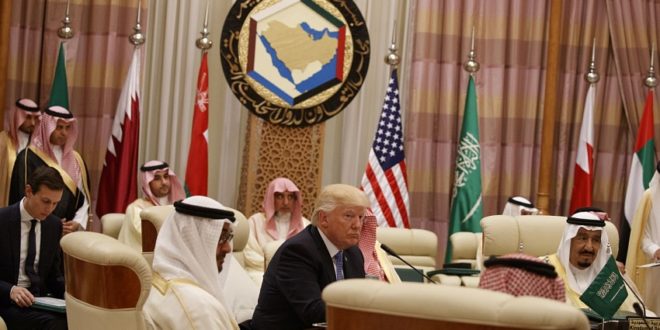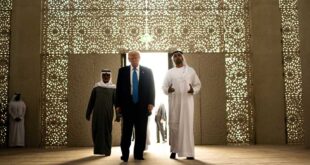Maria Al Makahleh (Dubovikova) and Shehab Al Makahleh
US President Donald Trump will host Gulf leaders separately in a bid to pave the way for American-Gulf summit scheduled for next spring, albeit in May in Camp David. This year’s meeting is different than those in previous years as almost a one-year rift between Saudi Arabia, the United Arab Emirates and Bahrain with Qatar still exists without being resolved in spite of all endeavors and shuttle missions of American officials to the region. The meetings this year with Trump will not help solve the issue as it is structural that requires Qatar to break its ties with the Muslim Brotherhood and to deport its leaders from Doha.
Gulf leaders are preparing for the “pilgrimage” to the United States in March and April to discuss the possibility to hold a US-Gulf summit, which has become an annual tradition, since the first meeting of this kind at Camp David, the American presidential resort in 2015.
While it is not clear whether the upcoming talks will result in the summit being held in its fourth edition after the last summit held in Riyadh, on May 21, 2017, it sounds that both sides of the Gulf conflict are preparing to gather as many power cards as possible to go to the White House, voicing hope to strengthen their attempts to gain the administration’s advocacy and support at the expense of the other side at a time Washington is not ready to resolve the dispute in favor of any of its four allies.
According to information provided by senior US officials two days ago, the first to arrive to the White House will be Saudi Crown Prince Mohammad Bin Salman on March 19, 2018 after a stopover in London where he is expected to meet with British Prime Minister Theresa May. His agenda hasn’t yet been revealed, but he will head from London to New York, Washington, San Francisco and Texas for talks on energy, technology, politics, industries, capital markets and education. Abu Dhabi Crown Prince Mohammad Bin Zayed will visit Washington two days later, followed by Emir of Qatar Tamim Bin Hamad Al Thani who will visit the White House in April.
Will Washington succeed to end the conflict?
Many argue that the US administration will not be able to reunite the Gulf allies because the US is benefitting more once they are not united. However, the constant focus in the coming meetings will be on counterterrorism as Trump will call on Qatar to take “more advanced” steps in this area and reward Doha for “obedience” to a series of agreements signed during the US-Qatar Strategic Dialogue last January. Washington would succeed in bringing together Gulf leaders under the banner of countering terrorism with the aim of reaching a symmetrical views to enhance effectiveness on many fronts as Secretary of Defense, James Mattis, said earlier.
Qatari Foreign Minister, Mohammed bin Abdulrahman Al-Thani announced his country’s readiness to participate in the US-Gulf summit, expressing his belief that “the situation will be under control in the end,” stressing “Qatar is sparing no effort in fighting terrorism, and all countries can do more.” The UAE Minister of State for Foreign Affairs, Anwar Gargash, said that “Saudi Arabia, Bahrain and the UAE should be given the credit as all the Qatari previous policies which include funding and financing extremism and terrorism have decreased. Qatar would not have conceded in this regard without such pressure form the three states, according to Gargash.
In spite of this, the dispute between the Gulf states has started to have other political dimensions that the US administration may not be interested to deal with, leaving a regional mediator, Kuwait, to play the role to bring the parties together. However, Kuwait feels now it is targeted in a way or another, driving it to call the British to have a military base in Kuwait, fearing military escalation.
Saudi Foreign Minister Adil Al-Jubeir said last week in Brussels that “Qatar is a small issue if compared to other important issues in the region”. However, Qatar continues its efforts by running media propaganda and diplomatic war to serve its own interest and to clarify its own stand at the international level.
Originally published by: Valdai Club | Image: Evan Vucci/AP
 Geostrategic Media Political Commentary, Analysis, Security, Defense
Geostrategic Media Political Commentary, Analysis, Security, Defense





